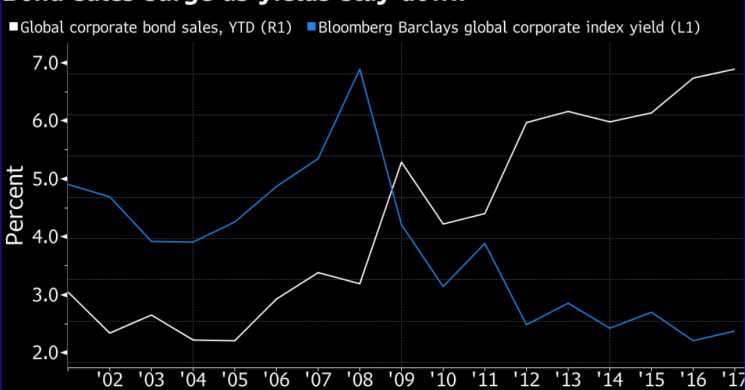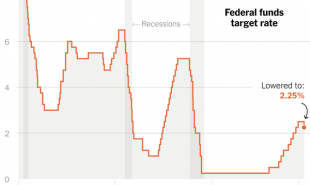
Bond Sales Keep on Climbing
Treasuries, along with most government bond markets across the globe, continue to defy predictions of an end to the three-decade bull run. U.S. 10-year yields are stuck in the tightest range since the 1960s, even as options pricing suggests that fears for a breakout are growing. The message for borrowers is crystal clear: time to issue! Among notable sales: Australia this week mounted a record auction of debt, and China took steps towards its first sovereign dollar bond since 2004. Nigerian banks and U.S. corporate giants were also in on the act. And then there's the bewildering array of animal- and food-themed offshore bonds -- Masala, Panda, Maple and now Komodo -- that saw sales.

The latest Fed minutes did their bit to keep yields down, striking a relatively dovish tone, as did the clouds surrounding President Donald Trump's tax reform plans. It seems likely bonds will stay in a sweet spot unless the American reflation outlook takes a hawkish turn.
Fed's Inflation Conundrum
U.S. policy makers continue to face an uphill battle convincing investors, and even themselves, that the economy is really hot enough to warrant the interest-rate hikes outlined in the Fed's forward guidance. That's a big part of the reason yields are holding below 2.40 percent -- the level Bill Gross said they need to breach sustainably to trigger an end to the bond bull market. Others are concerned the Fed's determination to normalize policy will create an inverted yield curve -- sometimes a recession signal -- next year. Adding to the current noise around the Fed's guidance, the president's search for the next central bank head continues, even if doubts are growing as to whether any fresh leader has the scope to change policy much.
Bonds, Glorious Bonds! Who Will Buy?
With apologies to Charles Dickens, and indeed Lionel Bart, bond issuance seems reminiscent of the classic number from the musical adaptation of Oliver Twist! Sales in a slew of markets have hit record annual highs, or are getting close. Wal-Mart Inc. raised funds to help it fight off Amazon.com Inc. British Columbia is considering selling Panda bonds in China and Masala notes in India, to add to recent local offerings, while Indonesia is launching Komodo bonds to add a giant lizard to the mix of market titles, Nigeria’s Fidelity Bank Plc sold the highest-yielding Eurobond from emerging markets this year, moving ahead of the anticipated Fed tightening that could drive borrowing costs higher. Australia was excited enough by all the demand out there to hold its biggest ever auction. That country has potential demand from $1.8 trillion of pension pools, though international debt funds are trying to convince that money to go offshore. Investors will just have to hope the rich diet of debt doesn't give them indigestion.
China's Congress a Big Event for Debt Issuance Too
China is ramping up for the Communist Party Congress as well as for its first sovereign bonds in dollars since 2004 -- a deal that will put a symbolic seal of approval on the booming offshore Asian debt market. The congress itself is likely to slow dollar-bond issuance from China’s borrowers this quarter, helping others wanting to tap a market already at a record high for issuance. Also in China, concerns are growing that a key initiative to rein in the world’s largest corporate-debt load may be doing little to reduce debt levels.
Puerto Rico's Pain Highlights Dangers Lurking
Hurricane Maria has been and gone, but the island's debt woes remain. About the only thing clear when it comes to Puerto Rico is that resolving its bankruptcy keeps getting harder. The U.S. territory's plight is a reminder that large debt loads can come back to bite, and some emerging market investors are starting to worry about the policy clouds building up on the horizon. The struggles for Singapore-based oil companies are another reminder that plenty can go wrong.
Goldman Bubble Bet, Citi's Trading Slump, Leveraged Froth
The credit crunch is a not-so-distant memory and yet Goldman Sachs Group Inc. and JPMorgan Chase & Co. are offering investors a new way to bet on the next one -- through derivatives on high-risk bank bonds that financial regulators can wipe out if a lender runs into trouble. Speaking of the previous crisis, U.S. plans to roll back federal regulations adopted for leveraged loans after that turmoil could pump up risk in a red-hot market. Meanwhile, many of the big banks themselves continue to suffer from declining bond trading income, with the situation at Citigroup Inc. tough enough to prompt Chief Executive Officer Michael Corbat to cut costs.
Read more by Soren K.Group







